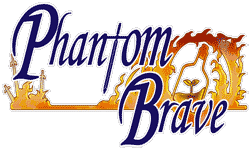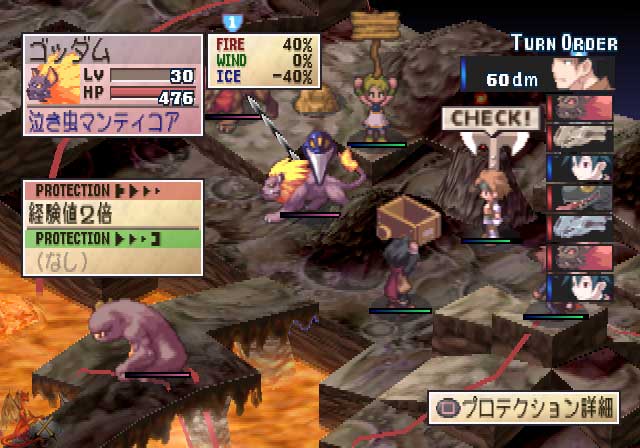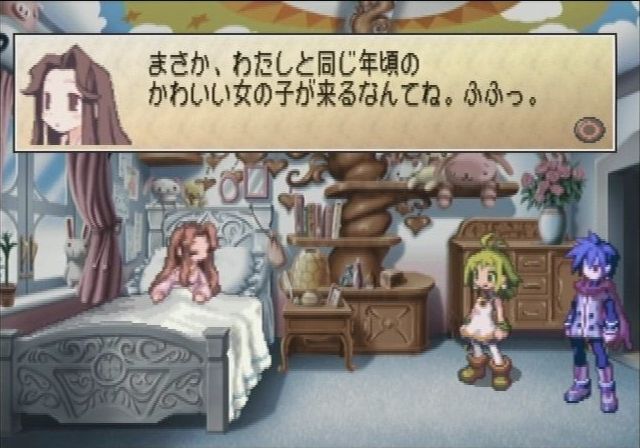|
|

|
BATTLE SYSTEM
|

|
INTERACTION
|

|
ORIGINALITY
|

|
STORY
|

|
MUSIC & SOUND
|

|
VISUALS
|

|
CHALLENGE
|
Unbalanced
|
COMPLETION TIME
|
25-50 hours
|
|
OVERALL
2.5/5
|
Rating definitions
|
|
|
When Nippon Ichi seemingly appeared out of nowhere with their quirky, but deeply brilliant Disgaea, they immediately set a bar for themselves higher than many gaming companies could ever achieve in their lifetime. As Irving Berlin once said, "The toughest thing about success is that you've got to keep on being a success." The earlier release of Rhapsody and the later release of La Pucelle were unimportant in relation to the brilliance expected of Phantom Brave, as only the latter was developed in the wake of Disgaea. Could Nippon Ichi cement its largely uncontested number one position in a genre starving for quality titles? Could they avoid the disconfirmed expectations generated by a lackluster follow-up to a hit title, as befell the Baulder's Gate: Throne of Bhall expansion? Could they really pull it off? After playing Phantom Brave, it becomes clear Nippon Ichi was not able to match, let alone surpass, the legacy of its own making. Much of the failure of Phantom Brave stems from its complete shift in paradigm from nearly everything that its predecessor accomplished.
Battles are no longer tactical affairs, and play out more like simplistic puzzle games. Marona confines the souls of Phantoms to objects on the battlefield, and the overall statistics of that Phantom change depending on the object. While this leads to some rudimentary strategy of confining warrior-type Phantoms to objects that increase strength and defense instead of things that do the opposite, the majority of the time the player is given quite a limited selection of possible objects depending on the terrain. The more immediate loss of strategy though, stems from the inherent time limit attached to all Phantoms - within three to eight rounds, depending on class, a given Phantom is automatically removed from battle. This encourages a more cavalier attitude in regards to Phantoms, as redundancy in Phantom creation is the only way to avoid the crippling loss of a key Phantom in the few battles that offer a modicum of challenge. Dead Phantoms do remain on the field and count towards the fifteen-Phantom cap so as to not appear entirely disposable, but with the absurd "Out of Bounds" mechanic implemented, getting past the Phantom cap is a problem easily remedied.
To explain why Out of Bounds fails as a concept is to illuminate a constellation of similar shortcomings in this game's design. The basic theory is that any object in play may be tossed outside the perimeter of the map to be instantly removed from battle. When the player does this with an enemy, all the remaining enemies level up, similar to how Disgaea allowed creatures to be combined by tossing one into the other. The problem that occurs is that enemies can do this to your own Phantoms, which not only removes them from your roster for this battle, but also removes the object they were confined to and any object they may have been holding. While most enemies engage in this tactic sparingly, it occurs often enough over the course of the game and swings enough battles in the Random Dungeons to warrant special mention.
 Wielding the real San Fransico Treat
Wielding the real San Fransico Treat
|
|
The gridless attack and movement system also bears some mentioning, none of which is positive. Putting it simply, the system is buggy as hell. The terrain often adds variables to movement such as bouncy, slippery, and the like which prevent the player from really ever knowing just how far their character can go, aside from individually moving each character and undoing the action when an undesirable result occurs. Indeed, the player will in all likelihood spend quite a long time tweaking a given character's movement in an attempt to get in a position to do something, anything that will not make it appear as if the Phantom just spent one of its limited turns being useless. Of course, if such experimentation results in the character accidently falling Out of Bounds, they reappear near the edge and are forced to accept the erroneous move. Phantom Brave does include a sort of Attack-Move option to ease combat along, but it falls prey to the problems mentioned above of terrain, falling out of bounds, and, if you are not careful, of attacking one of your own characters by mistake.
Players hoping for respite from the battle system will find none anywhere in the game. Between missions, Marona and Ash can walk around Phantom Isle listening to canned responses from the other Phantoms, or perhaps wasting time on the dumbed down equipment system. All Phantoms can essentially only equip a single piece of weaponry - no armor, no shields, no capes, no shoes, no accessories, and nothing else bearing any resemblance to a Tactics game, or even its predecessors. That single weapon can admittedly range from shrubs to femurs to axes to trolley carts, and Titles function like equipment that raises statistics, but trading complexity for novelty rarely works in this genre. Random Dungeons have replaced Item World, but offer no real meaning or similar sense of accomplishment upon completion. Generated randomly and then bought by the player, they serve an obligatory purpose rather than a meaningful or unique one. Beyond that, Phantom Brave does feature a decent fusion system where the player can fuse items or even characters together to combine their abilities, but that is not enough to even begin saving the game.
 Pretty much sums up the game.
Pretty much sums up the game.
|
|
In all honesty, the plot of Phantom Brave removes any hope of redemption. Following the tale of the orphaned Marona subjects one to same sort of hellish purgatory her Phantom protector, Ash, is undoubtedly suffering in silence. It is no secret that Disgaea was far from serious and had a rather large element of camp in its execution, but Phantom Brave blows all that away and back to the 2nd grade. Instead of Calvin and Hobbes or even Garfield, players experience My Little Pony. It is enough to make a grown man weep that such fantastic voice actors were forced to convey such a ridiculous script. Nippon Ichi offers players the choice of skipping every event scene in the game from the very beginning, and such a choice should be seriously contemplated even on the first playthrough. Certainly, it would shorten the average length of punishment to a more reasonable 25 hours.
As before, nothing in the audio or visual realm play much of a part in anything per Nippon Ichi's design philosophy. It nevertheless bears repeating that Phantom Brave perhaps could have appeared on the Super Nintendo sans voices and perhaps the event scenes, which is actually a fantastic idea. Nippon Ichi does deserve credit for resisting the urge to recycle sprites ala Growlanser 3, but it immediately loses that credit for producing another set of fairly repetitive background music. Some tracks are in fact good, but none of them are a part of the cycle that drones on for 90% of the game.
In many respects, objectivity is a luxury which sequels of popular games cannot afford. Is Phantom Brave's battle system truly a terrible thing for the casual player to behold? No, of course not; there are examples of much, much worse battle systems in other games. However, it would be doing the player a disservice to ask him or her to ignore the brilliance which came before, especially when the current offering displays the disparity in such sharp relief. If any solace can be gained, it comes from the words of Herman Melville: "It is better to fail in originality than to succeed in imitation." And it is even true that Phantom Brave has shown more originality in a single title than the genre has seen in almost a decade. Be that as it may, fans of this otherwise starved genre, and of Disgaea in particular, are certainly willing to settle for a little successful imitation now and then, given the alternative.
Review Archives
|









